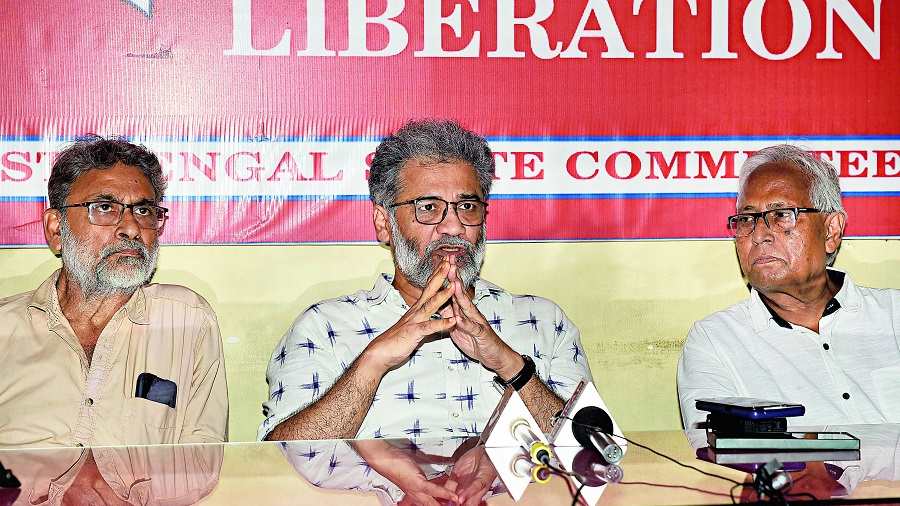CPI-ML (Liberation) national general-secretary Dipankar Bhattacharya, known for backing Mamata Banerjee in the run-up to the Assembly elections in Bengal in 2021, was critical of her on Wednesday in the context of the Trinamul Congress’s stand on last week’s vice-presidential election and her government’s alleged oppression of mass movements in the state.
Bhattacharya, whose party is now in the ruling coalition of Bihar after JDU chief Nitish Kumar’s volte-face, was stressing the need for the “widest possible alliance of Opposition forces” nationally to take on the BJP, when he brought up Trinamul’s stand that arguably made Jagdeep Dhankhar’s ascent to the post of India’s Vice-President easier.
“In the vice-presidential election, the stand the Trinamul Congress took, of equidistance, weakened the picture of Bengal’s politics of resistance, of Opposition politics,” said Bhattacharya, who drew the ire of the Left mainstream in Bengal last year for throwing his weight behind Mamata in the Assembly elections to keep the BJP out.
Bhattacharya was referring to Trinamul’s decision to abstain from voting in the vice-presidential election that took place on Saturday. The stance seemed to have diluted Mamata’s anti-BJP credentials and prompted allegations of an entente between her and the BJP.
“There is a big need for the widest possible alliance of Opposition forces. We keep saying this repeatedly. That keeps being built and then it falls apart,” said Bhattacharya, whose party with 12 MLAs has decided to offer outside support (without joining the government) to the new Mahagathbandhan government in Bihar.
“You saw how for the presidential election, the way Mamata Banerjee called for a meeting herself, a wide alliance of Opposition forces was more or less put together, dialogues took place, a common candidate (Yashwant Sinha) was fielded. But when we reached the stage of the vice-presidential election, I do not know why, it did not materialise,” he added.
The CPM and the Congress in Bengal have been accusing Mamata of a “setting” with the BJP, which they held responsible for her support for the NDA’s presidential candidate Droupadi Murmu, despite having fielded Sinha as the united Opposition candidate. They also attribute to the “setting” her party’s decision to abstain from the vice-presidential election, although the NDA’s candidate was her bete noire as the Bengal governor, while the Opposition candidate was Congress veteran
Margaret Alva, with whom she shared cordial ties for decades.
“Who spoke to whom, who called whom, these questions were raised... and they did this,” said Bhattacharya, referring to Trinamul’s decision to abstain from the vice-presidential election. Trinamul attributed such a move to an alleged unilateral announcement of Alva’s name without consulting Mamata.
Bhattacharya went on to express “sadness” over the Trinamul-led state government’s treatment towards mass movements here.
“The significance of movements, across the nation, has increased exponentially than ever in the recent past. There must be better coordination between (non-BJP) governments and the movements on the streets. I have to say this with sadness that it is not happening in Bengal,” he said.
“In Bengal, the elections had turned into a mass movement last year, with things like “No Vote to BJP” playing a role. Aided by the movements, Mamata Banerjee secured a third term with an enhanced mandate. But after coming to power here... the state government has been neglecting the agenda, the voice of the movements. It has been resorting to oppression, suppression, framing in fabricated cases,” he added. “This goes against the role of Bengal in the Opposition movement in national politics.”
Bhattacharya also stressed the need for consolidation of maximum possible non-BJP players across the country to take on the “24x7 saffron election machinery” ahead of 2024.
“The widest possible alliance of Opposition forces must be formed, and it must also be made more acceptable to the people. Just the arithmetic of 10-20 parties coming together will not do,” he said.
“The people’s aspirations and the ongoing movements of the masses, their energy is much more intense, compared to many of the Opposition parties. Many of them (the Opposition parties) are there today, but gone tomorrow. But the spirit of the farmers’ movement, for instance, or the movement by students and youths by the Gandhi statue here, or the Shaheen Bagh movement against the citizenship matrix... that energy, dynamism and spirit need to be infused into the Opposition alliance. We cannot see that now,” he added. “We need the widest possible alliance, with a bare minimum ideological basis, such as our democracy in peril... besides greater acceptability to the masses. Bengal, like Bihar, is a great place for work towards that.”
Hoping the developments in Bihar would have an impact on the entire Hind-speaking belt and in national politics.
“The way attempts are on to attack, corner, weaken the Opposition, fell non-BJP state governments... there, Bihar has put up some resistance. That resistance will send out a message to the entire national Opposition. With that message, armed with more determination, the Opposition camp across India will see a restructuring, is what we hope,” he said.











